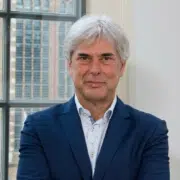A new multi-disciplinary HCSS report summarises the findings of a study examining strategic trends and likely trajectories in the evolution of transnational organised crime and organised crime groups (OCGs), situating these within the wider context of global systemic and structural change.
The report introduces a new, simple framework for describing the main forces shaping modern organised crime. This framework captures various factors that come under 5 categories of analysis and the interrelationships between these categories: (1) the goods and services that underpin global criminal business; (2) the people involved in or sustaining criminal activity; (3) the money, financial systems and economic infiltration that underpin illicit trade; (4) technology, which increasingly permeates all forms of organised crime; and (5) the extent to which all these variables allow criminal actors to project (political) power and exert de-facto control over (new) territory.
Using this analytical approach, this study produced the following findings:
- Organised crime in today’s interconnected world consists of increasingly fluid, decentralised, technologically savvy and resilient trading networks. These networks leverage a wide range of professional service providers and systemic enablers as part of their operations.
- Transnational organized crime increasingly relies on a shadow (or parallel) global illicit economy as well as clandestine transfer and investment vehicles, although these often intersect with and exploit the formal regulated financial system. Criminal financial structures are erected using complex financial and corporate structures to conceal the true (beneficial) ownership of funds behind a veneer of legal commercial activity.
- Organised crime’s social and economic embeddedness, as well as recruitment into criminal organisations, increasingly take place within the context of rapid demographic, technological and systemic change. Migration and urbanisation are contributing to the proliferation of social breeding grounds and ‘hotspots’ of organised crime, which are often found amidst pockets of poverty and marginalisation and/or where formal governance systems and key services are lacking.
- The activities of and markets available to OCGs are likely to further expand within the context of increased international multipolarity and geostrategic competition. The international community’s reinvigorated focus on state-on-state as well as existential (conventional and nuclear) threats is likely to result in a reduction in focus on sub-state forces and actors.
Building on these findings, the study highlights an overall evolution towards what amounts to the fourth generation of crime, characterised by devolved, distributed, cellular, efficient networks that are increasingly embedded within the societal fabric. This next generation of organised crime also fuses and compresses the distance between different domains, functions, roles and services around the world. Here, structural opportunities, political and social vacuums, legal and regulatory loopholes, global financial solutions, criminal supply chains and retail markets are all invariably connected in what amounts to a complex, integrated, helixed and self-regulating (shadow) economic system.
In real terms, this has arguably led to a net amplification of the relative (political) power, economic clout and, correspondingly, overall threat posed by organised crime, most significantly seen in the suffocation and distortion of licit economies and the erosion of formal governance systems and the ‘rules-based international system’ – which is already in rapid retreat at the state level.
This study highlights several implications for the international community’s response. It first explains how the framework introduced in this study can be leveraged for the purposes of strategic and predictive multi-disciplinary analysis of organised crime developments and as an aid to formulating policy interventions. It then outlines some of the different types of interventions that can be brough to bear against the phenomenon, distinguishing between direct (such as criminal justice and law enforcement) responses and indirect (such as broader social or political) approaches that can be brought to bear against the phenomenon, whilst emphasising the extent to which its complexity and fluidity make international cooperation imperative. Finally, it makes the case for encouraging the incorporation of crime-relevant provisions within post-conflict settlements and better reflecting the subject and study organised crime within the fields of international relations, international security and strategic studies given the increased propensity for OCGs to act as agents of influence and political change in the modern world.
Authors: Julien Bastrup-Birk, Erik Frinking, Linde Arentze, Eline de Jong and Frank Bekkers.
This research has been conducted by HCSS on behalf of the Dutch police, as part of the multi-year Strategic Monitor Police programme. This programme aims to provide an ‘outside-in’ and future-oriented view and interpretation of relevant trends and developments to support the strategy creation process of the Dutch police.
Cover image credit: Unsplash








